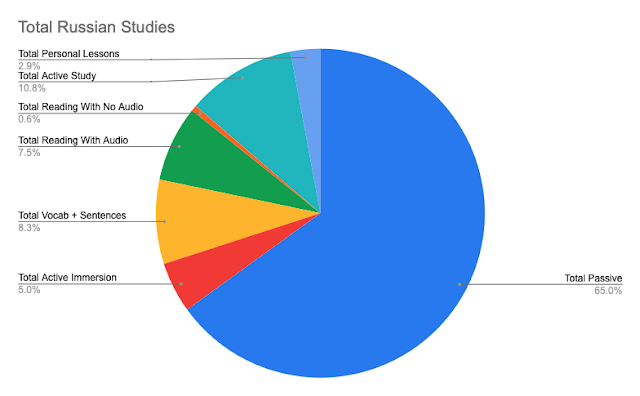3 year overview of my Russian acquisition journey
For anyone interested here's an overview of my Russian acquisition journey over the past 3 years (I started in August 2020). Click on any of the charts to get a closer look.
I think this data is 98% accurate. However as time goes on I'm starting to encounter more and more Russian in day to day life which I don't count. For example, reading memes, seeing what friends post on social media, writing messages, meeting Russian speakers in real life.
In all my activities I try to focus on material that is of practical use. So I don't read fantasy books like Harry Potter or watch media like Anime. I very rarely watch series or shows but when I do it's usually contemporary drama. In the 5% of time that I'm not reading or listening to material from Speakly I will watch street interviews or dialogues aimed at beginners (Easy Russian, Russian With Max).
Activity Overview
Passive Immersion: Listening to audio in the background while I do other things (work, cleaning, walking, gym). Since March 2021 exclusively Speakly monologues. My attention comes and goes depending on what I'm doing. A percentage of this could technically be classified as Active Immersion because when I'm able to (for example between sets at the gym) I'll be fully focussed on trying to understand what I'm listening to. This used to take up 70% of my time but it's starting to come down.
Active Immersion: Fully concentrated watching or listening with no distractions.
Vocal + Sentences: Anki, or focussed acquisition of new words like reading the Roots of the Russian Language.
Reading with Audio: Mostly Glossika but also LingQ when I've worked through a Speakly monologue at least once. I don't think I've always been consistent with placing LingQ activity either in this category or under Active Study.
I find myself usually categorising it as Active Studying because half the time I need to work to figure out the meaning of a sentence. Sometimes I will understand the individual meanings of words but not the meaning of the sentence as a whole. So I'm not always fluently reading with full understanding.
Reading with No Audio: Something I avoided for a long time but have consciously taken up in the past couple of months since I became more confident with my pronunciation. Although I still make mistakes of course, which I discover during my conversation practice.
Active Study: The broadest category. Includes using the Speakly app, reading up on grammar, reading through a text (usually Speakly monologues) in LingQ for the first time, but as noted earlier I probably added re-reading texts to this category occasionally. Transcribing Speakly dialogues. Various apps have come and gone. I've recently started Russian Accelerator.
Personal / Tutor Lessons: Lessons started using comprehensible input but are now conversation practice sessions avoiding English as much as possible unless it helps to explain a grammar point, new vocabulary, idioms etc. Topics are prepared in advance but we often go on tangents.
*Free Conversation Practice (Speaking Practice): Practicing with people in real life or on apps like Tandem. About 3 hours in total but not included in the charts below. This is hard to keep track of precisely but I'll try going forward.
Cumulative but broken down by activity.





I’ve been doing Russian accelerator since July of 2022 and it’s been great. I’ve learned a lot of grammar in what I think is a natural way, though my speaking ability is pretty poor since I don’t have much practice outside of RA. I’ve recently started with LingQ to help develop vocabulary.
ReplyDeleteThat's great to hear. I really like the course, especially for the super literal translations that help me understand how Russian is actually thought / spoken. I don't get a chance to do it every day, usually only once or twice a week (which means I'm running behind. I'm in Unit 4 but up to Unit 14 has been unlocked).
DeleteIn the beginning it was quite simple for me because I had learned so much already, but it's getting more interesting. And I don't mind that my vocabulary is far ahead of what I'm learning. As I said for me it's more valuable for the way it introduces grammar. In that respect it's better that I already know most of the vocabulary because it allows me to focus on the other stuff.
Thanks for leaving a comment btw. How do you feel you are progressing?